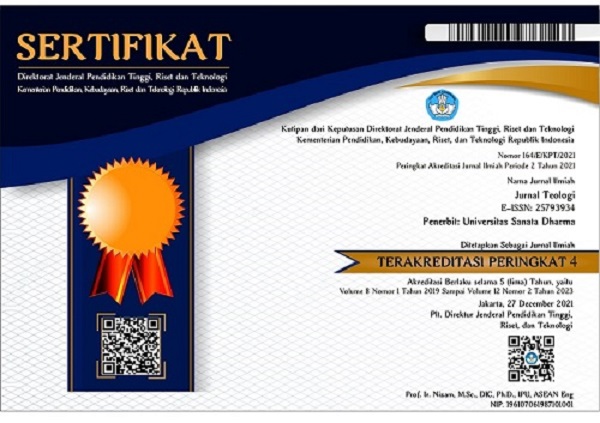Teknologi dan Dominasi atas Alam Kritik Paus Fransiskus dan Heidegger terhadap Paradigma Teknokratis atas Alam
(1) Sanata Dharma University
(*) Corresponding Author
Abstract
What Pope Francis said about environment crisis, then confirms what Heidegger had long thought. The paradigm, which Heidegger calls “framing” (gestell), then penetrates the world of politico-economy, so that the economy accepts any technological advances that bring benefits, regardless of the possible negative impact on humans and other creatures. In a profit mindset, there is no room for thinking about natural rhythms, phases of withering and regeneration, or about the complexity of ecosystems. Nature is only thought as an economic resource. To overcome this, humans need to be educated. Humans need to be aware that humans exist in a reciprocal relationship with nature. Human existence is not a separate thing from nature but exists in the same ecosystem. Furthermore, humans need to realize that participatory action to pay attention to nature is fundamentally compatible with cultivating a relationship with God. Panentheism encourages humans to respect creation, because in creation, God is not only present, but also continues to work in it.
Keywords
Full Text:
PDF (Bahasa Indonesia)References
Boff, Leonardo. Cry of the Earth, Cry of the Poor, trans. Philip Berryman. Maryknoll, NY: Orbis Books, 1997.
Borgmann, Albert. “Technology,” A Companion to Heidegger, ed. Hubert L. Dreyfus and Mark A. Wrathall. Oxford: Blackwell Publishing, 2005.
Ellul, Jacques. The Technological Society (terj. John Wilkinson). New York: Knoft, 1964.
Feenberg, Andrew. “Philosophy of Technology at the Crossroads: Critique of Heidegger and Borgmann”, Philosophy of Technology, oleh Robert C. Scharff dan Val Dusek (eds.). West Sussex (UK): Willey Blackwell, 2014; 362-374.
Guardini, Romano. The End of the Modern World. Wilmington, 1998.
Hardiman, F Budi. Heidegger dan Mistik Keseharian, Jakarta: KPG, 2003.
Haught, John. ‘‘Darwin and Contemporary Theology,’’ Worldviews: Global Religions, Culture, and Ecology, Vol. 11, 2007.
Heidegger, Martin. A Question Concerning Technology and Other Essay (trans. William Lovit) New York: Harper & Row, 1977.
Hrynkow, Christopher William. “Greening God? Christian Ecotheology, Environmental Justice, and Socio-Ecological Flourishing”, Environmental Justice, Vol. 10, Number 3, 2017, DOI: 10.1089/env.2017.0009: 81-87.
Kaplan, David M. “Technology and Capitalism”, A Companion to The Philosophy of Technology, oleh Jan Kyrre Berg Olsen, Stigandur Pedersen, dan Vincent F. Hendricks (eds.). West Sussex, Oxford, MA: Wiley-Blackell Publishing Ltd., 2009; 333-337.
Leder, Drew. “Modes of Totalization: Heidegger on Modern Technology and Science”, Philosophy Today, Fall, 1985.
Menezes, J. Inocencio. Manusia dan Teknologi. Telaah Filosofis J. Ellul. Yogyakarta: Kanisius, 1986.
Paus Fransiskus, Ensiklik Laudato Si’: Tentang Perawatan Rumah Kita Bersama (terj. Martin Harun OFM). Jakarta: Obor, 2015.
Santmire, H. Paul. “Partnership with Nature according to the Scriptures: Beyond a Theology of Stewardship,” Christian Scholar’s Review 32 (Summer 2003): 381–412.
Sarewitz, Daniel. “Technology and Power”, A Companion to The Philosophy of Technology, oleh Jan Kyrre Berg Olsen, Stigandur Pedersen, dan Vincent F (eds.). Hendricks.West Sussex, Oxford, MA: Wiley-Blackell Publishing Ltd., 2009; 308-310.
Zachery Hayes. A Window unto the Divine: Creation Theology (Winona, MN: Saint Mary’s Press, 2008).
DOI: https://doi.org/10.24071/jt.v10i2.3353
Refbacks
- There are currently no refbacks.

This work is licensed under a Creative Commons Attribution-ShareAlike 4.0 International License.
.jpg)
Indexed and abstracted in:
P-ISSN: 2302 - 5476 (Validity starting Volume 2012-10-05)
E-ISSN: 2579 - 3934 (Validity starting Volume 6, No. 1, Mei 2017)
Jurnal Teologi (Journal of Theology) by Faculty of Theology Sanata Dharma University

This work is licensed under a Creative Commons Attribution-ShareAlike 4.0 International License.














